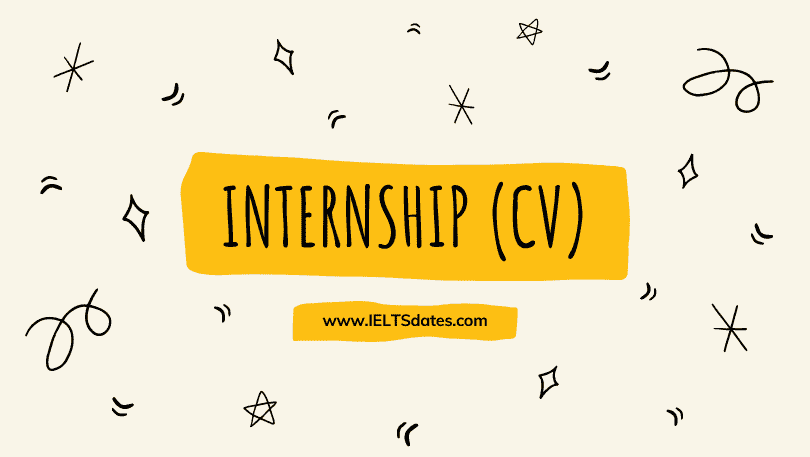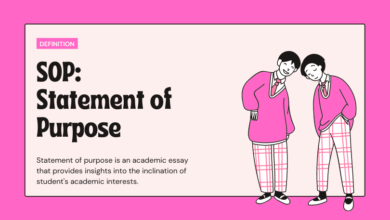Resume, Curriculum Vitae (CV) for an Internship Application with Format and Samples

There was a time when the concept of quality education was underrated. People preferred the difficult path over education. But life has got a whole lot different today. Quality education is considered to be the basis of one’s life. But this quality education does not come affordable for everyone. So in order to give each individual a chance, they’re given an opportunity to win an Internship which will grant them a direct ticket to that college. But if you want to earn it, you’ll have to fulfill some requirements which do not come in easily. The first thing you’ll be asked for is an Internship CV. If you want to know more about it, then stay tuned till the end.
Resume (CV) Definition:
CV is abbreviated for Curriculum Vitae which is a Latin word that means the course of life.
The Internship CV means the course of your academic life and its future. An Internship CV is a vital document that needs to be on point for acceptance. This is the very first document an Internship panel demands for and the reason is that it provides a brief view of who you are as a student and how can you become a leader.
This CV document usually consists of the personal details of the candidate, academic record, qualifications, future aims, and other relevant information that can prove to be beneficial for putting a good sight on the panel.
Format of an Internship Resume (CV):
The Internship CV should be composed in a formal and professional manner. This document is reviewed by an Internship panel that receives thousands of CVs which are drafted sharply. If you follow the layout given below, you’ll surely draft an exceptional CV.
- Beginning Part:
The CV must contain a beginning part with all the essential personal and academic details informing the reviewer about your qualification, recent institute, and other academic details.
- Body Part:
The body part generally constitutes three to four medium-sized paragraphs which are comparatively longer than the beginning and ending parts. This part contains information such as achievements, abilities, skills, passion for the area of the subject, the reason behind choosing this university, career goals, and references. The language used in this part should be kept convincing not begging, yet official.
- Ending Part:
This part is the ending part which contains the summary of the whole CV. The major points should be picked out of the CV and compressed into small sentences to be added in this part.
Highlight points in the Internship CV:
The Internship CV is an essential document and that is why it must be composed very carefully and smartly. The CV must consist of the following major points that will make your document stand out among the others.
- Valid information:
The beginning of the CV must contain some of your personal details along with the academic details such as full name, contact, address, educational achievements, job experience, and extracurricular activities.
- Objectives and Targets:
Don’t hesitate to mention your future goals and aims in the document. These aims will provide to the panel a preview of how well planned you are and how you can execute it.
- Insertion of correct information:
This document will decide your academic future which is why it should be based on correct and accurate information. Refrain from providing false information regarding your personnel and future goals. Or else things might get messy for you in the near future.
Pro Tips on Writing a CV for internship:
- Brainstorm your achievements:
Before commencing your document, make a chart in which you write all of your achievements in academic and extracurricular activities. Then cut short the important ones. This way you’ll be more organized and well aware of the points you have to include.
- Word limit and Font:
The Internship CV should not be very lengthy. One to two pages are enough. A minimum word limit of 1,500 words is necessary and the official font such as Calibri, Verdana, and The Times should be used.
- Usage of power words:
Usage of short sentences with power-pact words can deliver your message in the shortest possible words. This will put a good impression on the reviewer and increase your chances of selection.
- Deduct irrelevant information:
Deduct all the irrelevant information and events of your life from the CV. This will portray an unprofessional impression on the reviewer. Only valid and relevant points should be added.
- Give your CV a Grammarly Check:
Grammatical errors should not at all be underestimated as minor mistakes as they can be the key to your rejection. Therefore, check your grammar not just once but twice or thrice.
- Recheck your CV:
Recheck your CV at least twice by yourself and ask any friend to review it for you once before submitting it. This way you can get maximum chances of getting zero errors. It’s always better to be safe than sorry.



